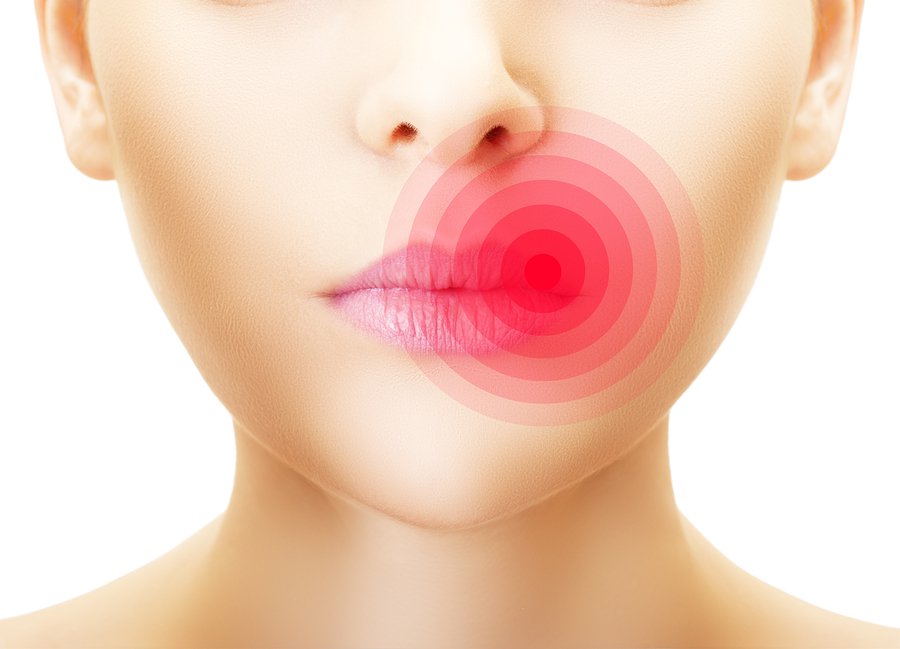How to treat and avoid cold sores during party season
A fluid-filled blister is the one thing you definitely don’t want Santa to bring you this Christmas. Liz Connor reveals top tips for managing and banishing these painful lesions.
Nothing will spoil the Christmas party season like breaking out with a cold sore.
Not only are they painful and itchy, but they’re near impossible to hide – speaking from experience, no amount of industrial concealer make-up will mask the fact that you’ve got a small-scale model of Vesuvius erupting around your mouth.
Given that they tend to rear their ugly heads when you’re rundown and tired, the party season can be a particularly common time to get struck down with one of these unsightly blisters.
For many of us, they’re also are a recurring problem too – once you have the cold-sore virus, it stays in your body for the rest of your life, leaving you fearful of your next random outbreak.
With that in mind, we spoke to Dr Petra Simic, clinical director at Bupa Health Clinics, to find out how to look and feel your best during cold sore season…
What exactly are cold sores?
“Cold sores, known as herpes simplex virus (HSV), are clusters of tiny blisters that appear on the lip or around the mouth. While they can cause a lot of pain and make you feel self-conscious, they tend to disappear without scarring,” explains Dr Simic.

Cold sores can be itchy and painful
“The virus is passed on by saliva – so kissing is the most common way it is spread from person to person. It passes through the skin and travels up the nerves where it will lay dormant until triggered.
“There are a number of triggers that fuel an outbreak, particularly at this time of year when our immune systems can be lower. Feeling emotional, rundown and tired are all factors that can leave you at risk.”
Act fast
The first sign that a cold sore is on its way is a tingling or itching feeling. “Some people describe it as a burning sensation,” says Dr Simic.
When you feel the first twinges of a cold sore, he recommends starting treatment immediately. “This will slow it down and help manage the outbreak,” he advises.
“Over-the-counter treatments won’t stop the outbreak, but it will reduce the reproduction of the virus and relieve the symptoms.”
Ice, ice, baby
Rubbing an ice cube over the sores or placing a cool, damp flannel over them for five to ten minutes can also reduce redness and irritation.

“It’s something to consider during this time of year when there are a lot of social occasions to attend and sufferers may feel more self-conscious about having a sore,” says Dr Simic.
Wait it out
Sadly, if you do find yourself with a cold sore this winter, there’s very little you can do but wait for the blisters to heal.
“Ibuprofen can help ease painful symptoms too, but unfortunately, there isn’t a treatment that eradicates the virus completely,” says Dr Simic.
So can you safely cover up a cold sore?
“Covering up a cold sore with concealer or other make-up isn’t advised,” warns Dr Simic. “Especially during the early stages, because it can help spread the infection and make the situation worse.
“If a cold sore becomes infected with bacteria it can cause impetigo – another highly-infectious skin condition that causes blisters and sores.”
If you want to try and hide your cold sore with make-up, he advises waiting until it’s reached the ‘scab’ stage. Apply a thin layer over cold sore cream, so that the cosmetics aren’t directly touching the sore.
“If make-up is applied then it’s important to dispose of any lipsticks or applicators that have been used, to minimise the chance of the virus spreading,” he adds.
A final tip? “If a skin condition persists and starts to impact your quality of life, go and see your GP or book an appointment with a dermatologist.”
Do you suffer? What tips can you share with us that work for you?
The Press Association
Latest posts by The Press Association (see all)
- Beatles documentary Let It Be to be released on Disney+ - April 16, 2024
- How to keep your money safe – as criminals ramp up AI tactics to steal consumer data - April 16, 2024
- Seasoned marathon runners give their best race day tips for first-timers - April 16, 2024
- What are heat pumps and could they help your home save energy? - April 15, 2024
- Trailer for Bridgerton season three teases new friends-to-lovers romance - April 12, 2024





















